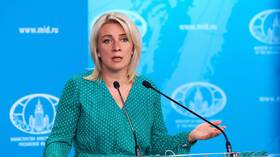EU country wants to seize Russians’ guns
Estonian PM Kallas says firearm confiscation will be rubber-stamped by the legislature soon
Nationals of Russia or Belarus living in Estonia who own firearms will be given a deadline to surrender them voluntarily, or have them seized by police as security threats, Estonian Prime Minister Kaja Kallas said on Monday. All the details of the law to that effect have been worked out, the cabinet just has to present it to the legislature, she added.
There were 629 people who would be affected by the confiscation, Kallas was told during an interview on Monday, and asked how she envisions carrying it out.
“In any case, we will send this draft law to the Riigikogu during the current government’s term. This has already been agreed upon, and a deadline has been set. We will definitely give time for people to voluntarily hand over their weapons, and after this deadline expires it will be the police’s turn,” she said, according to the outlet Postimees.
Asked if she expects the gun owners to comply voluntarily, Kallas said it was “difficult for her to judge.”
I hope that given the current circumstances, people will understand that the citizens of Russia and Belarus with weapons in their hands are a threat to the security of Estonia.
The former Soviet republic has been an outspoken supporter of Kiev in the current conflict over Ukraine. Last month, the government in Tallinn voted to stop issuing Schengen visas – documents needed to enter the European Union, of which Estonia is a member – to Russian nationals. That too was justified by Kallas as a “security threat.”
Between that and the ban on financial transactions with Russia, many Russian nationals who own property in Estonia may end up having it confiscated by the state.
Kallas had resigned as PM in July when her coalition fractured over the proposal to switch education in the country of 1.3 million entirely to Estonian. She has since put together another coalition cabinet, and is proceeding with the plan to make sure that “in Estonia, everyone must speak the state language, especially those who make decisions.”
That statement came in reference to Narva, a city on the Russian border where the local government mainly converses in Russian.
You can share this story on social media:








Comments are closed.